Reel house
April 30, 2021
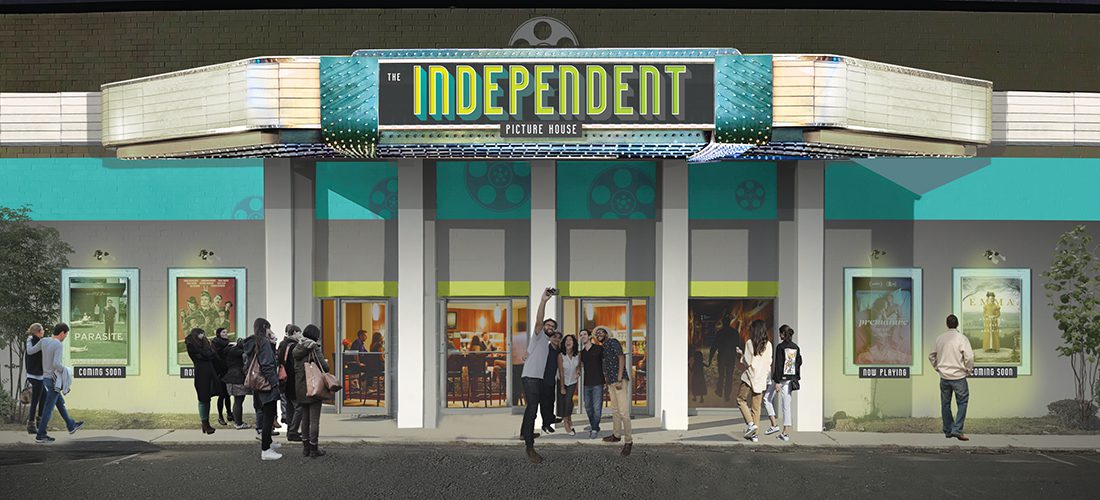
Movie buffs grieved when the Manor Theatre shuttered after 73 years. Charlotte Film Society’s new three-screen theater will give indie films a forever home in the Queen City.
by Michael J. Solender | photographs by Grant Baldwin
When Brad Ritter’s phone buzzed late one Friday night last May, his boss’s illuminated number on the screen forebode ill tidings. Ritter, longtime general manager of the Manor Theatre, Charlotte’s last remaining art house cinema, suspected the worst. His fear was soon confirmed.
“I knew what was up, but he wouldn’t share the news on the phone,” Ritter says. “We met the next day at the Manor, where he told us the decision to close the theater and indicated everything had to go. As I looked around the lobby, my eyes fixed on the popcorn maker, and I began to imagine it anchoring the concession stand of a new theater. Right then, the wheels began to turn.”
Ritter, an avowed cinema buff, recognized the Manor’s demise as an opportunity for the Charlotte Film Society, where he serves as president. The community-based nonprofit’s mission is bringing independently produced art house films to Charlotte. Ritter’s kernel of an idea began to pop into something that had long been on the minds of CFS members and its board of directors — a dedicated theater owned and operated by the film society.
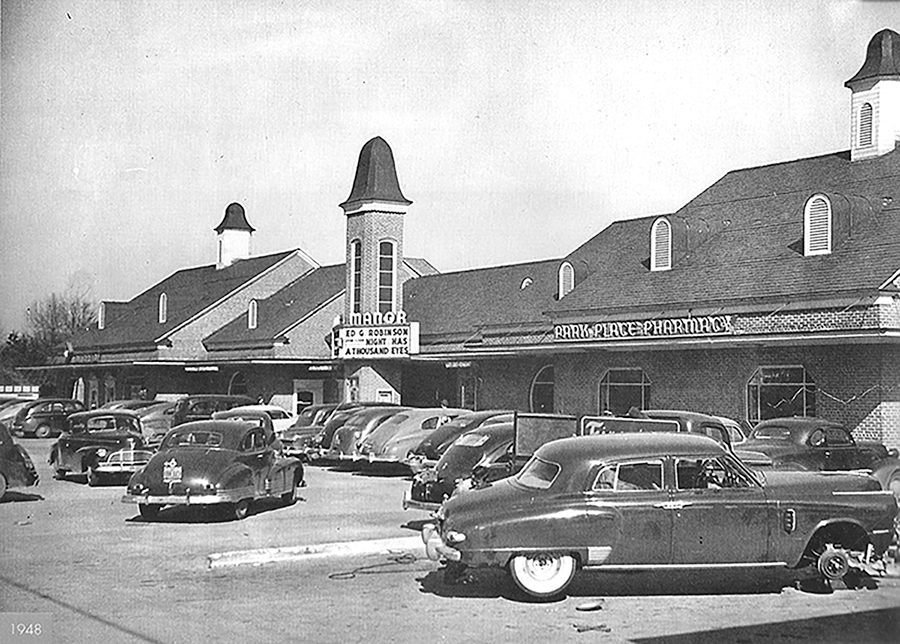
The Manor opened in 1947 in a small retail center on Providence Road, which today houses a Panera Bread, barre studio, beauty boutique and a Thai restaurant. Eastern Federal Corp. owns the property but sold the screens to Regal Cinemas in 2005. Rumors began swirling a few years ago that Eastern Federal was mulling replacing the center with a mixed-use development. Future plans for the site remain unclear.
Losing the Manor on the heels of the similarly fated Park Terrace and Ballantyne Village theaters left the city without any established cinemas regularly showing independent films. (Now owned by AMC Theatres, The Park Terrace at Park Road Shopping Center reopened in 2019 and today screens mainstream movies.) Cinephiles across the city expressed alarm. Many reached out to Jay Morong, longtime CFS program director and senior lecturer of film studies at UNC Charlotte. “I got calls almost immediately from the community asking what the film society was planning to do in light of the Manor’s closing,” Morong says. “People simply assumed we were going to work to fill the void. If we didn’t address the need, who would?”
As news of the Manor’s closing seeped into public view, community connections led Ritter to the principals at the Flywheel Group, a local design and development firm spearheading the Trailhead District, an ambitious arts and entertainment project in NoDa’s north end. Before long, plans were drawn for a new theater in a redeveloped industrial building there. The space is just a two-minute walk from the Sugar Creek Station along the LYNX Blue Line.
The Independent Picture House will house three screens, with seating for 108, 86 and 27. In addition to full concession offerings, the theater will serve beer and wine, with an adjacent outdoor patio for lingering before and after screenings. The theater is on track for a late fall opening.
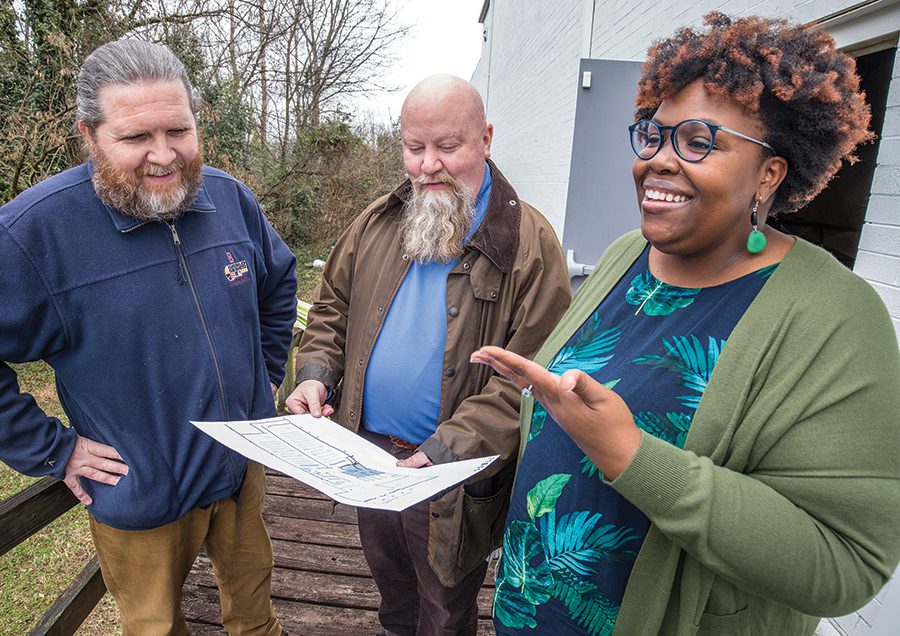
Charlotte Film Society holds a special place for cinema fans across the Charlotte region. Established in 1982 after Charlotte’s then-premier art house, the Visulite Theatre, converted to a live event venue, the all-volunteer film society has consistently worked to bring lesser known and avant-garde indie flicks to the Queen City, often partnering with local art collectives and cultural institutions. In 2019, CFS screened 48 films through its Back Alley Film Series and Saturday Night Cine Club and through collaborative screenings with VisArt Video, arts incubator C3 Lab and The Light Factory. Over the years, CFS also has worked with International House, LGBTQ film festival Reel Out Charlotte and the Charlotte Jewish Film Festival.
In 2020, CFS took over operations and administration of the long-running Charlotte Film Festival, a nonprofit annual event. Last September’s five-day online virtual event screened 150 films and attracted 7,000 viewers from 42 states.
“We considered postponing the festival last year with the pandemic but didn’t want to lose momentum and had so many great films to showcase,” Morong says. “Absent a current home and facing the pandemic, we currently offer about 10 different films a week through our site (charlottefilmsociety.com) in a video-on-demand format online screening room.”
Two fundraising campaigns are underway to help lay the foundation for the Film Society’s vision. As of early April, more than 800 contributors had donated to a grassroots GoFundMe appeal launched last fall. The campaign has reached three-quarters of its $150,000 goal, with the funds earmarked for projection equipment and installation costs. A larger, quieter appeal supported by Foundation For The Carolinas is ongoing to underwrite theater build-out costs, initial rent and operating funds to provide a fiscal onramp for the organization’s self-sustainability.
“When we initially began our GoFundMe drive, it took off like a rocket,” says Angel Truesdale, vice president of the CFS board. “It’s clear the community is behind us. It’s reassuring for the board to show other potential funders as we build a community cinema [that] we have a large family of support behind us.”
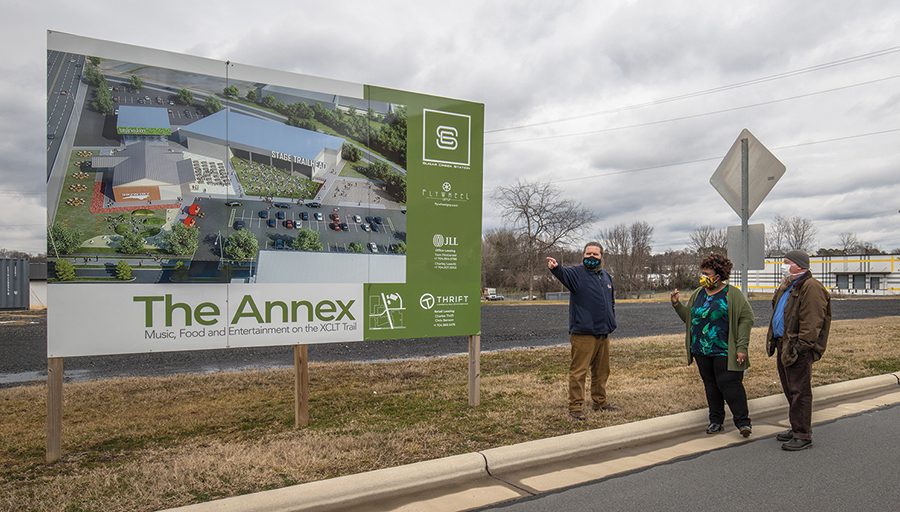
Jay Morong, Angel Truesdale and Bradley Ritter of Charlotte Film Society discuss future plans for The Independent Picture House. 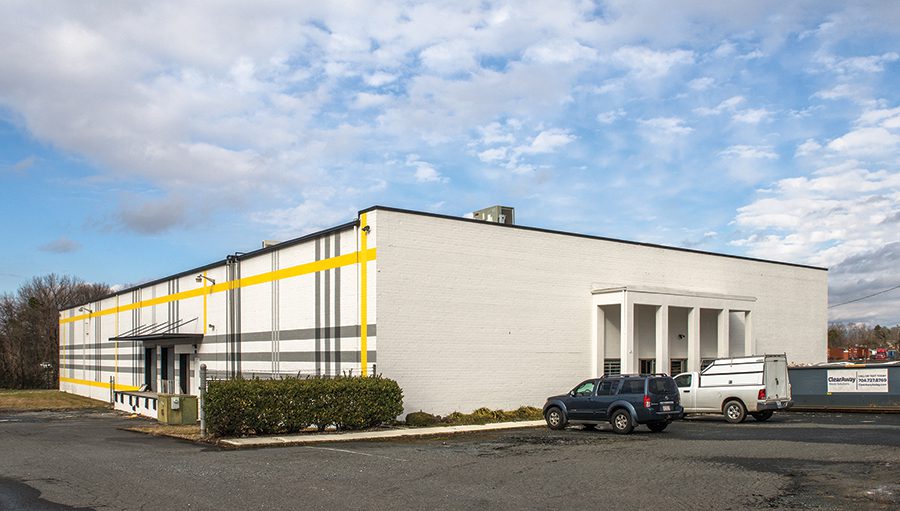
Location of the future Independent Picture House. 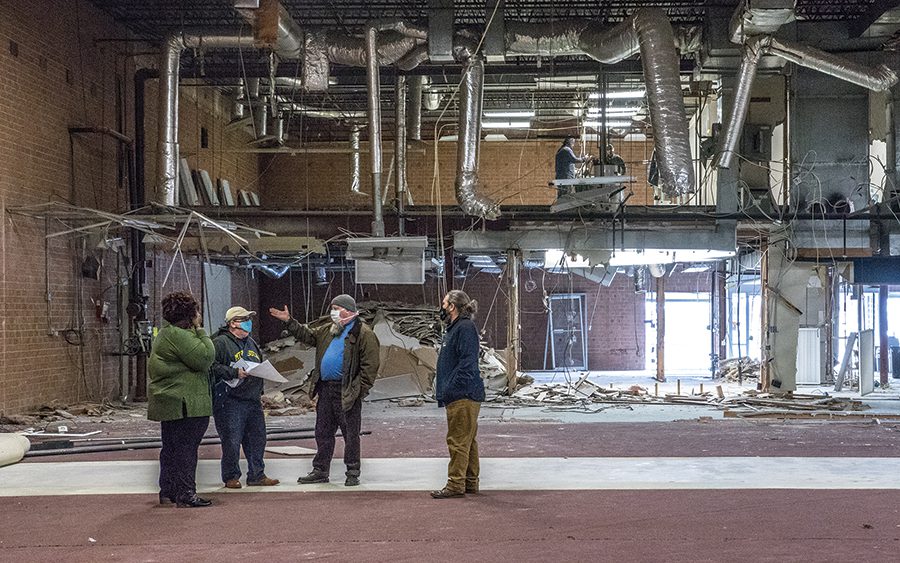
The principals behind The Independent Picture House tour the space in which the theater will be constructed, currently in the demolition phase before main construction begins.
Morong is excited about the programming opportunities possible with a dedicated theater, which will be open 365 days a year. “Charlotte residents can expect us to continue bringing high-quality indie films to the region — just a lot more of them,” he says. “We’re going to build on our foundation and provide exposure to the next level of art house films, including smaller-budget and experimental movies. The Charlotte Film Festival will have a fixed home at our theater, and we are welcoming and encouraging other area festivals to look to us as a potential host for their events. We want to work with them and want to be a community center for film.”
Local filmmakers will find an eager partner with the new theater as a venue for hosting screenings and connecting with audiences. “We’re blowing up our old model,” Ritter says. “Our own theater allows us to pursue corporate sponsorships, tiered memberships and more ways to deliver classic films to the community.”
In return, filmgoers will find a cinematic haven at the Independent Picture House, complete with the Manor’s celebrated popcorn machine. Ritter rescued seats, curtains and the concession-stand marquee from the closed theater, all poised for a second act at the new theater.
There has always been a demand for independent film in Charlotte, and the recent art house closings appear more reflective of rising property values than lack of interest in culturally important films. CFS looks to capitalize on this appetite and create a cultural touchstone for the city.
“There is a tradition across the country of showcasing independently made films,” Truesdale says. “In recognizing the culturally important contributions independent cinema makes to the community, we’re inspired by models and resources established by organizations like [Ann Arbor, Mich.-based nonprofit] Art House Convergence. The Independent Picture House is here for the community, and the community is here for us.” SP
Top: the Charlotte Film Society’s rendering for a new three-screen theater in NoDa.

